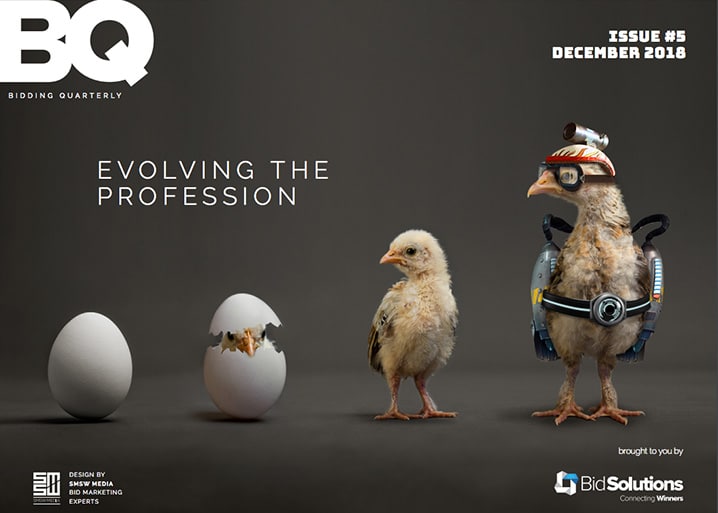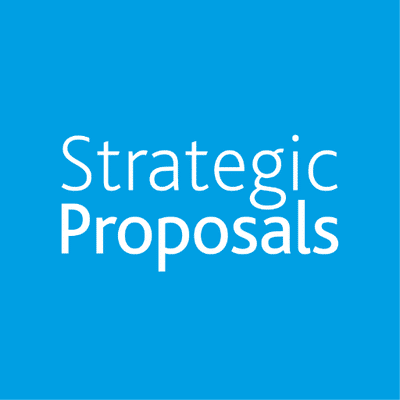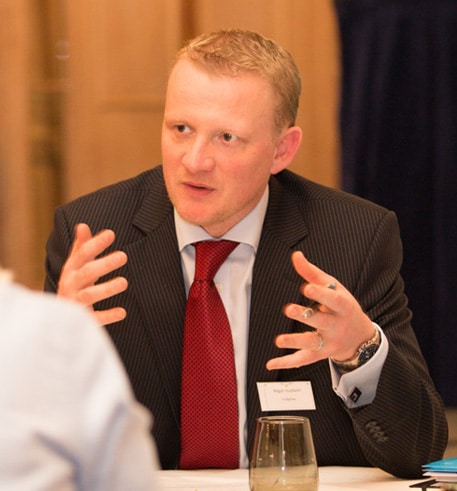Ask the Expert – Kathryn Potter
Do you Need a Bid Library?
Our Content Management Expert, Kathryn Potter, has been asked whether it is worth investing in a Bid Library.
Kathryn’s fantastic response explains what a bid content library is, how you get one and how you make it work effectively. To read Kathryn’s full response, click here: https://bidsolutions.co.uk/questions/are-bid-content-libraries-really-worth-it/
To ask Kathryn (or any one of our 20 Experts) a question, click here: https://bidsolutions.co.uk/bid-hub/ask-the-expert/
Looking for a new role? Browse our current vacancies here.
Bidding Quarterly Issue 5 Out Now
Bid Writer News – Bidding Quarterly
At the time of writing, 2019 has significant uncertainty surrounding it. Thankfully, our experts are adept at dealing with such ambiguity. They’ve provided a fantastic set of articles in Issue 5 of Bidding Quarterly, full of great ideas for any bid writer and suggestions to evolve our profession in 2019.
Click here to download your copy.
Articles included cover topics such as hopes for the future of the APMP, our representative body. Will changes to its structure bring more support for bid writers working in the UK? We also look at how the bid writing process could evolve, ensuring that our teams get the support they need to win. Is the process becoming more seller-led? If so, how do we respond to that?
We discuss the important question of certification. With no formal educational route into bid writing, how do we assess the quality of candidates? Bid Writing courses are on offer, but should we be holding out for APMP certification?
Psychologist Rob Stewart offers his insights into the stresses of the bid and tender writing industry. He gives suggestions on how we can take better care of ourselves and each other. We also look at bid writer recruitment, and how that has changed over recent years. If you’re looking to recruit a bid writer or to find new challenges in 2019 that’s the article to start with.
Whether you’re a freelance bid writer or have a permanent role there is something in the newsletter for everyone to read. We hope it inspires you to think about the future of our industry as we come to the close of 2018 and look forward to next year.
If thinking about 2019 has you considering making a change in your career, then get in touch. We’d be happy to help connect you with the next great opportunity in this fast-paced, fascinating and challenging industry.
Ask the Expert – Andy Haigh
Our public sector expert, Andy Haigh, has been asked for advice on how someone new to bidding can justify the need for attending bid writing courses. The person in question has undergone a starter course but feels further training is needed to improve their success rate. To view Andy’s response, click here.
Andy is an expert in bidding and tendering, specialising in competitive formal bids into EU Public Sector organisations. Andy is an authority on EU procurement legislation and can bring all these capabilities together to initiate and drive major complex bids through to successful completion. He assists in optimising the strategic direction of the bid and directing, managing and supporting the bid activity as required.
To ask Andy a question, click here: https://bidsolutions.co.uk/experts/andy-haigh/
In addition to Andy, we have 19 other Experts, all with different areas of specialism. To find an Expert and ask a question, click here: https://bidsolutions.co.uk/bid-hub/ask-the-expert/
Bid Writing Courses
To learn more about our bid writing courses, click here.
SMSW Media – The Ad Agency for Bids
In the drive to write a winning bid, have you ever stopped to think how different your proposal documents would look if you treated them like adverts?
If the honest answer is no, don’t worry – not many have. That’s exactly why, when we found ourselves with a blank page in the printed version of BQ magazine and a looming deadline, we called on Simon Wellstead.
Simon is creative director at SMSW Media, the ad agency for bids. Yes, you read that right, an ad agency for bids.
How SMSW Craft a Winning Bid
SMSW’s approach is fuelled by the belief that the magical simplicity of messaging from the golden era of advertising (50s and 60s) should be applied to every bid and sales campaign. Simon and his team have been surprising and exciting clients for over 10 years by highlighting business differences through compelling, captivating and creatively intelligent winning bid campaigns.
Simon is an exceptional storyteller and his work nods to some of the finest ad men including Ogilvy, Bernbach, Lois, and Arden.
Getting back to that blank page in BQ magazine, it didn’t take long for Simon to transform the space into a self-promoting ode to the creatives of old.
The ad didn’t appear in Bidding Quarterly‘s digital version so we wanted to share it here for anyone who missed it to enjoy.
Click Here
If you haven’t spoken to Simon yet and are tasked with improving bid quality and win rates, or want to inject first-class creativity into your bids or pitches, we would highly recommend getting in contact. He’s always happy to offer valuable tips and advice (stolen from the masters of course).
If you enjoyed this content, then you might also get something from our, ‘Ask the Expert‘ series of articles where industry leaders share their knowledge and answer your questions.
News & Jobs From Bid Solutions
Senior Bid Manager
We have a great opportunity for a Senior Bid Manager to join a growing team in Kent that is undergoing significant investment. The role will be split between managing live deals, developing and amending existing bid processes and line managing a Bid Coordinator. If you are a Bid Manager local to the area and want a new, rewarding challenge, please review the job details here: https://bidsolutions.co.uk/jobs/?keywords=VAC-16873
Our latest Permanent Opportunities this week include:
Senior Bid Manager Opportunity working for a major global legal practice based in London. Salary is competitive – https://bidsolutions.co.uk/jobs/?keywords=VAC-16950
Proposal Manager Position in Wembley working for a construction and civil engineering firm. Salary is up to £50k + Car Allowance – https://bidsolutions.co.uk/jobs/?keywords=VAC-16948
Bid Manager Vacancy in Manchester working for a leading law firm. Salary is competitive – https://bidsolutions.co.uk/jobs/?keywords=VAC-16945
Senior Bid Writer Position for a major security firm, with time split between London and home. Salary is competitive – https://bidsolutions.co.uk/jobs/?keywords=VAC-16954
Bid Coordinator (French or German Speaking) Position with a global material handling manufacturer based in Frimley. Salary up to £37k – https://bidsolutions.co.uk/jobs/?keywords=VAC-16907
Bid Executive Vacancy in Manchester working for a leading law firm. Salary is competitive – https://bidsolutions.co.uk/jobs/?keywords=VAC-16947
Bid Specialist Opportunity working for a leading logistics firm based in Uxbridge. Salary up to £33k – https://bidsolutions.co.uk/jobs/?keywords=VAC-16918
Bid / Submission Coordinator Role in Wembley working for a construction and civil engineering firm. Salary is up to c.£30k – https://bidsolutions.co.uk/jobs/?keywords=VAC-16949
More Bid Manager Vacancies
For a full list of current job opportunities please visit: https://bidsolutions.co.uk/jobs
News & Jobs from Bid Solutions
How the Best Win – Advice from Strategic Proposals on how to write a winning bid
Our close friends at Strategic Proposals recently launched their thought-provoking ‘How the Best Win’ report. This demonstrates the direct correlation between proposal capabilities and win rates and recommends key, practical steps that organisations can take to gain a competitive advantage in the bid process. It’s a must-read for Heads of Bid and Proposals, Sales Directors and C-Suite Execs responsible for winning work.
You can download your own copy here: https://www.strategicproposals.com/resource-centre-research-and-papers/
For more expert opinion and useful resources to help you craft a winning bid, visit our Bid Hub.
Our latest Permanent Opportunities this week include:
Bid Manager Vacancy in Manchester working for a leading law firm. Salary is competitive – https://bidsolutions.co.uk/jobs/?keywords=VAC-16945
Bid Team Leader Opportunity with a global material handling manufacturer based in Frimley. Salary up to £55k – https://bidsolutions.co.uk/jobs/?keywords=VAC-16885
Bid Manager Role with a leading FMCG provider based in Kent. Package up to £55k – https://bidsolutions.co.uk/jobs/?keywords=VAC-16873
Bid Coordinator and Senior Bid Coordinator Opportunities within a leading architectural firm in London. Salary up to £45k – https://bidsolutions.co.uk/jobs/?keywords=VAC-16944
Bid Writer Position working for a leading construction organisation based in London. Salary up to £40k – https://bidsolutions.co.uk/jobs/?keywords=VAC-16939
Bid Writer Vacancy based in Orpington, Kent for a construction firm. Salary up to £40k – https://bidsolutions.co.uk/jobs/?keywords=VAC-16942
Bid Writer Role based in Swindon for a business services firm. Salary is competitive – https://bidsolutions.co.uk/jobs/?keywords=VAC-16928
Bid Coordinator (French or German Speaking) Position with a global material handling manufacturer based in Frimley. Salary up to £37k – https://bidsolutions.co.uk/jobs/?keywords=VAC-16907
Bid Specialist Opportunity working for a leading logistics firm based in Uxbridge. Salary up to £33k – https://bidsolutions.co.uk/jobs/?keywords=VAC-16918
More Bid Writer Jobs
For a full list of current job opportunities please visit: https://bidsolutions.co.uk/jobs
New & Jobs from Bid Solutions
Scroll down for our Bid Writer Vacancies.
Managing Expectations for Well-being
Our Construction Expert and Professional Coach, Holger Garden, has written a fantastic article on the subject of well-being and stress management. His article explores how he manages expectations to ensure he can do a better job of helping his clients and managing his own well-being.
You can view the article here: https://bidsolutions.co.uk/leave-me-in-peace/
To ask Holger a question (or any of our 19 experts), click here: https://bidsolutions.co.uk/bid-hub/ask-the-expert/
Our Bid Hub is a great source of information including more advice from experts, industry news and other free resources to help improve your bid or proposal process. Our articles cover all aspects of the bid writing process, to keep you at the top of your game.
Our latest Bid Writer Vacancies and more this week include:
Proposal Manager Role for a fast-growing IT organisation in London. Salary is competitive. https://bidsolutions.co.uk/jobs/?keywords=VAC-16935
Senior Bid Manager Opportunity with a global material handling manufacturer based in Frimley. Salary up to £55k. https://bidsolutions.co.uk/jobs/?keywords=VAC-16885
Proposal Manager Position with a leading financial services firm based in Central London. Salary is competitive. https://bidsolutions.co.uk/jobs/?keywords=VAC-16931
Bid Manager Vacancy on a 6 Month FTC covering maternity, based in London. Salary up to £45k pro rata. https://bidsolutions.co.uk/jobs/?keywords=VAC-16938
Bid Manager Opportunity with a leading FMCG provider based in Kent. Salary up to £45k + Car Allowance. https://bidsolutions.co.uk/jobs/?keywords=VAC-16873
Bid Writer Position working for a leading construction organisation based in London. Salary up to £40k. https://bidsolutions.co.uk/jobs/?keywords=VAC-16939
Bid Writer Vacancy with a leading healthcare provider based in Leicestershire. Salary up to £38k. https://bidsolutions.co.uk/jobs/?keywords=VAC-16940
Bid Coordinator Position working with a leading security organisation based in Sutton, Surrey. Salary up to £35k. https://bidsolutions.co.uk/jobs/?keywords=VAC-16923
Bid Specialist Opportunity working for a leading logistics firm based in Uxbridge. Salary up to £33k. https://bidsolutions.co.uk/jobs/?keywords=VAC-16918
For a full list of bid writer vacancies, and other bid & proposal job opportunities please visit: https://bidsolutions.co.uk/jobs
Will You Leave Me in Peace While I Get the Work Done!
“I got eight little fingers and only two thumbs
Will you leave me in peace while I get the work done!”
‘Working On It’ by Chris Rea in ‘New Light Through Old Windows’
I’ve learned some essential lessons about managing stress in bidding, and about managing others’ expectations so I can do a better job of helping my clients – and, crucially, of managing my own wellbeing. I plan ahead to avoid scenarios that make me feel I can’t cope.
Stress management is needed for mental health and wellbeing. Research has shown stress to result from demand / resource imbalances1. Our stress response is mediated by resources and our perceived ability to cope, both factors that can increase – which means stress can be controlled1.
Managing Stress Through Planning
I’ve learned the best way to control stress is to plan for best use of resources, leading to the highest perceived ability to cope with demands. My resource planning includes five key influences: time, expectations, productivity, comparison, and communication.
Time is usually my most important resource. I work with bid teams to determine realistic timescales for producing strategies, writing plans and draft responses, and the supporting inputs and resource schedules. We include time for receiving review feedback, editing drafts, and compiling the submission.
With much less experience, I allowed myself to work without bid plans agreed from the start. This meant there was no guiding plan to align everyone, so contributions were uncoordinated and too late to be useful. I did a lot of stressful ‘heavy lifting’ to recover the bids. A plan agreed, and reviewed regularly, is essential because it reinforces the need for everyone, including those outside the bid office (e.g. SMEs and senior management), to play their part on time.
The plan sets timescale expectations, which we need to complement with specific daily goals, including how others’ input matters. I get the best from others when I’m clear about what I need, and about the effects of changes. I once worked on a bid in which a changed commercial proposal came at 7 pm on the day before a noon deadline for a printed submission. The changes caused significant edits to most sections. I worked all night to make the edits, including formatting. In those days, I didn’t sufficiently appreciate the importance of being clear about expectations, so the team saw no problem presenting late changes. I should have been clear about the impacts of late changes. Needless to say, my stress in the morning was extremely high as I rushed to compile the printed copies.
Feeling that my productivity is high is a great way to reduce stress, linked to a higher perception of achievement and ability to cope. Since clients judge me on results, I’ve learned the importance of being where I do my best work. Some days, I need to be with team members to review topics, benefiting from ‘bouncing’ ideas around in the room. Other days, I need to be alone to use the information gathered to produce responses. A day’s writing in an environment fostering concentration and clear thinking – which may vary from the bid room to my home or a remote flexible office – increases my motivation and makes me feel I’m ‘winning’.
One of my greatest stressors has been the comparison of my work with others’, but I’ve learned that comparison isn’t usually meaningful or useful since different team members work on different subjects with different requirements and constraints. However, it is useful to share ideas on ways to be productive, learning from others’ experiences.
I’ve worked in bid teams with a strong competitive culture causing friction. I find healthy competition stimulates momentum, but the real measure of progress is delivery against the plan. I used to be anxious seeing other writers tap away furiously while I sat thinking, but I learned that a good writing plan pays dividends for faster writing of more convincing messages. The key is to have enough confidence in your own work to avoid being drawn into the spiral of self-doubt from seeing others working.
Communication of issues and sharing concerns are great stress alleviators. Other people see solutions from different perspectives. Teams are more receptive to people who raise concerns as they arise than to those who don’t or who are unclear.
As George Bernard Shaw said, “The single biggest problem in communication is the illusion that it has taken place.” For me, this means checking everyone understands what they need to do, so the right team contributions lead to strong bids in which stress is managed well.
- Lazarus, R.S., & Folkman, S. (1984). Stress, Appraisal and Coping. New York: Springer.
by Holger Garden, Construction Expert and Professional Coach
Issue 4 of Bidding Quarterly focused on mental health in the Bid Writing Industry. For more articles about managing stress, and other coping strategies, download your copy today.
Bidding Quarterly Issue 4 – The Hidden Costs of Bidding
Bidding Quarterly Issue 4 – The Hidden Costs of Bidding
With more than 1 in 4 people now expected to be impacted by mental health problems, there has never been a more important time to prioritise your own well-being. As the leading bid recruitment agency, we know how stressful the bid process can be.
When we decided to lead this edition of Bidding Quarterly with mental health, I was somewhat apprehensive about what we might publish, Mental health issues always seem to be in a special category of their own when it comes to being unfit to work. A bit of a taboo.
I think most of us can think of a time when we have questioned our own mental well-being; some of you might be doing it right now, Whilst help is at hand, I know from personal experience that it can be hard to seek out. To admit to mental health issues, or be self-aware enough to recognise the symptoms, is seemingly not in our basic makeup.
Bidding is without question at the higher end of the stress spectrum. It is inevitable we will be pushed beyond our comfort zones on a regular basis. But what are the hidden costs of this and in reality are you sacrificing yourself to win? Perhaps you do it because you feel the need to impress your manager or maybe you just love the thrill of winning, or perhaps you can’t afford to be out of work? Whatever your reasons, have you really considered the dangers of this cyclical self-inflicted stress?
I can relate to much of what has been written by our experts this month – by far some of the best contributions we have ever published. Whilst I learned something new from all our experts, one bit of advice really resonated with me.
Nigel Hudson gives a candid and somewhat harrowing account of what can happen if you ignore the warning signs for too long. One piece of advice he gives is particularly poignant:
“Bidders inherently give our all, but absolute focus should only be given to that which matters absolutely. We should seek to win, but not at all costs”.
– Martin Smith
Download your copy here: https://bidsolutions.co.uk/bidding-quarterly-issue-4-hidden-costs-bidding/
Looking for a new opportunity? View our latest vacancies here.
The Cost of Winning – Nigel Hudson
Nigel Hudson: multi-award-winning bid manager and professional, leader of teams, winner of £3bn of new business, boaster of a 98% win rate, capability builder, thought leader and personal development expert. Wow. What a superhero. Let me tell you the other side of the story.
Becoming a Bid Manager
Back in 1999, while working as a marketing copywriter, I was introduced to the world of bidding. “Fancy writing a bid, Nige?” said the Sales Manager. “I reckon you’d be really good at it. It’s a high pressure, high-adrenaline role that favours those who love ‘pure challenge’. You’re obsessed with customer value and crafting a compelling story, you relish taking on seemingly impossible tasks and have the stamina to emerge victorious when others have fallen. I think you’d enjoy and be energised by this activity.”
“But be warned: bidding is a deadline-driven environment where you ‘do what you do’ to get the job done. There’s no 9-5 working, instead, you graft hard – often ‘giving your all’ – to close the deal. If that means slogging it out through the night, or all weekend, or cancelling holiday, or selling your soul to please the client, then that’s what you do. This is the activity that feeds the business, so if you don’t do everything you can to win, then the business will starve and we’ll all suffer. I’m looking to you to be my white knight.”
Crikey, this would be a full-on job. I gave it a go, writing a proposal that didn’t win. (The contract was awarded to the company that was best friends with the client and had written the RFP.) But I learned from my mistakes and got progressively better until I was winning virtually everything I bid.
In 2007 I was recruited to help set up and coach what would become one of the world’s most successful bid teams, growing it from four people to a global team of 220 in 2014. I loved this environment, as everyone was so passionate about winning (success breeds success, and the thrill of the chase is addictive), and I relished the world where ‘normal isn’t normal’.
I was working 100 hours per week, managing up to 22 concurrent bids, mentoring up to a dozen people at a time, and ‘filling the gap’ left by ineffective salespeople during customer presentations and negotiations. In short, I was being a typically kind-hearted bid manager. Burnout, however, was inevitable.
In June 2014, I experienced my third breakdown in ten years.
The Build Up
I’m going to describe the build-up of what happened so that – should you experience similar symptoms – you’ll recognise them, know your limits, and be able to ease off before things get worse. Ready? Here we go:
Adrenaline is good. It helps to spark us into action when we face a ‘fight or flight’ situation. This is fine in the short term, enabling us to focus more and work harder, but it’s only a short-term fix. With bidding, we’re often in a constant state of stress driven by a mixture of internal and external deadlines and stakeholder pressures.
Adrenaline sustained me for the first three years of my bidding career, but then I became tired and fuzzy-headed. Ocular migraines (a ‘waterfall’ sensation in one’s vision, combined with headaches and nausea) were common. I wasn’t as alert or clear thinking as before, moving slowly and having trouble remembering names and actions.
I was working twenty-hours a day, so didn’t have the luxury of getting a good night’s sleep, so I resorted to caffeine tablets to keep me going. Just a few at first, then, as my fatigue grew, taking up to twenty a day washed down with energy drinks. Caffeine killed my appetite, so I skipped meals and just ate biscuits, crisps, and chocolates at my desk.
All that sugar? I grew a ‘bid manager biscuit belly’, putting on three stone and becoming chronically unfit. I ended up in hospital, having collapsed in the bathroom with blood pouring from my backside. The diagnosis? Caffeine had scorched away my stomach lining. I gave up the tablets, but not the energy drinks or commitment to deadlines.
Coffee was more socially acceptable in the workplace, so I purchased a double espresso every thirty minutes of the day from the on-campus coffee shop. These drinks kept me going, helping to sustain my reputation as being ‘the highest energy, nicest and most enthusiastic bid manager you’ll ever meet’. But I was pale skinned and vitamin-depleted from lack of sunlight and scared stiff by ‘fluttery’ heart palpitations and savagely-painful chest spasms.
Also, my behaviour was becoming unpredictable. Normally happy and amenable, I was becoming argumentative, impatient, disrespectful and intolerant of others’ views, seeing everything as a crisis. I began ranting and seeking to intimidate anyone who got in my way. My actions reduced two colleagues to tears.
Realising that I couldn’t trust myself to behave rationally, I elected to work from home. There, with the phone ringing relentlessly and a hundred emails landing in my inbox every hour, I sat at my desk, numb to everything and barely able to lift a limb. My wife encouraged me to see a doctor, who explained that the reason for my near-inability to pick up the phone, or react to my environment, was because my adrenal gland was depleted and temporarily unable to produce more adrenaline.
“You could be standing in the middle of the road,” said the doctor, “with a juggernaut approaching you, and you’d be unable to jump to safety – even though your mind would be screaming for you to escape.” He also educated me about how people react to stress, in that we either become a more intense version of our self or behave in the opposite way to normal. “If you like detail, you might find yourself delving deeper and deeper into the detail; or if you’re nice then you might become nasty.” I was signed off work for two weeks, prescribed a four-month course of Cognitive Behavioural Therapy, and told to take a holiday.
I returned to work and was immediately instructed to attend training courses on stress management. The best of these was called ‘Turning Stress into Resilience’ run by two coaches from the British Olympic Association. It taught me that, in addition to maintaining one’s fitness and endorphin levels through daily exercise (“if it doesn’t make you sweat and lose your breath, you haven’t done enough”), managing stress is a straightforward ‘biological’ task: that how we think and behave is a result of how our brain processes information.
If it isn’t getting a consistent supply of oxygen (blood) then it cannot perform properly. That’s why we occasionally ‘see red’ or act ‘without thinking’. The way to ensure clear thought? “Stay adequately hydrated and remain calm,” they said. “If your heart’s beating regularly then your brain will receive the consistent flow of blood it needs.” I learned that my pulse could be slowed to a steady rhythm by sitting still and breathing deeply and slowly.
The technique worked great until I went to the office on 28 May – my birthday. I was about to leave at 6 pm, so that I could enjoy a birthday meal with my wife, when a customer emailed me with their demands for a BAFO submission by 7 am the following morning. I would have to cancel my celebrations, get my team back into the office, and work through the night. I did all this and submitted the proposal on time. And then the same thing happened the following night, and every night for five months.
I kept going, ‘doing what I do’. But I felt like the world was conspiring against me. When the customer – a car manufacturer – finally accepted our 100th BAFO, I was hailed as a hero for bringing satellite navigation to vehicles in Europe. But a colleague had suffered a fatal heart attack during the process and my marriage was in tatters. Was it worth the sacrifice? I vowed that no customer, colleague, competitor or supplier would ever force me or my team to give so much again. My vow, and health, was short-lived.
In June 2014 I woke at home to find my body aching so much that I could barely move. I managed to roll out of bed in an attempt to get up and dressed for another day of ‘bidding excellence’. I landed with a thump on the floor, then pulled myself vertical by hanging onto the bedside table. It contained my socks, so I removed a pair from the top drawer, but couldn’t remember, or figure out, how to put them on my feet.
I turned to my wife, who was lying in bed, and – while doing my best to breathe – attempted to tell her that something terrible was happening. Then a young girl ran into my bedroom, singing ‘Morning Daddy’. I didn’t know who she was, nor could I remember ever having a daughter. With my heart pounding my ribcage, I collapsed on the floor and crawled under the bed.
Seven hours later, I was sitting in a hospital room with a doctor standing next to me. She was speaking to someone on the telephone, saying words that included “anxiety disorder”, “depression”, “bipolar”, “psychotic episode”, “risk”, “danger”, and was insisting that I be detained for the safety of myself and those around me.
She then ended the call and spoke to me, explaining that the other person on the phone was a consultant who had convinced her that I would not be a threat to society so long as I agreed to a programme of medication. This seemed like a better alternative to being sectioned, so I agreed to take the anti-depressant and antipsychotic drugs. They made me sleep almost non-stop for six months and then exist without internal thought for a further four months.
I’d lost my mind in order to win.
When I finished the medication and returned to work, I was calmer, more controlled, and more aware of the best way for me to win ‘on my terms’. I’d previously been too keen to say yes, too hungry for success, too loyal to my cause, too keen to prove myself, too scared to stand up to my managers, too ‘compliant’ to challenge a customer, too proud to ask for help, and too stupid to learn at the same pace as I was moving.
I would now say “no” to the noise of urgency and “yes” to what was important, which would enable me to stop ‘doing the doing’ and instead manage through others. My mission was (and still is) to encourage and empower people through training, coaching, mentoring, writing and public speaking, to find ‘the thing’ that makes them brilliant, so they can play to their strengths while never allowing themselves to do things that compromise their well-being.
We bidders inherently give our all, but absolute focus should only be given to that which matters absolutely. Be grateful for everything you experience; it provides opportunities for you and others to learn. But take ownership of your actions. As I learnt from my illness: “The only person to blame for your situation is you”. You’re not fully in control if you blame others for something that you could have influenced for the better.
Create a culture of winning, but do it on your terms. Remember: say “no” to that which will drag you down, and “yes” to that which will make you brilliant. Play to your strengths. Be smart. Win, but not at all costs.
For more expert advice and opinion to help you be a more effective bid manager, check out our Bid Hub, or view our latest vacancies to find your next challenge.








